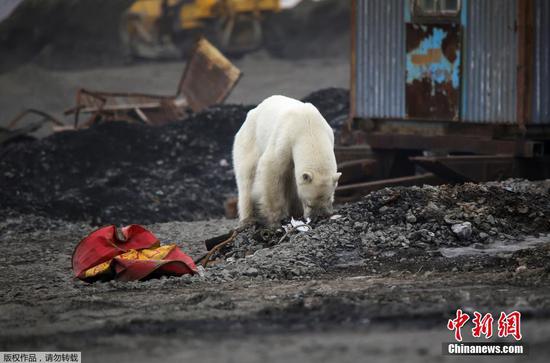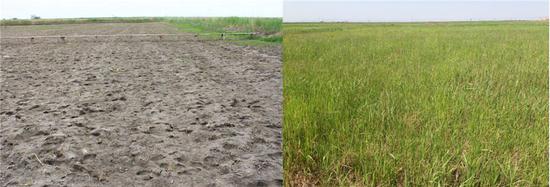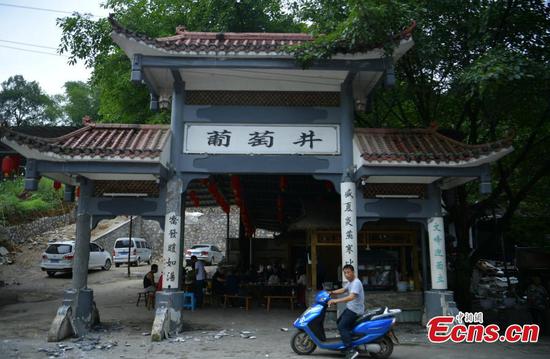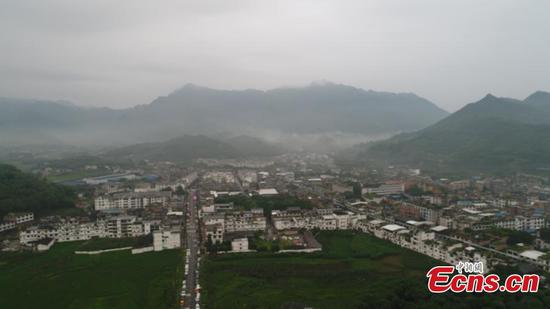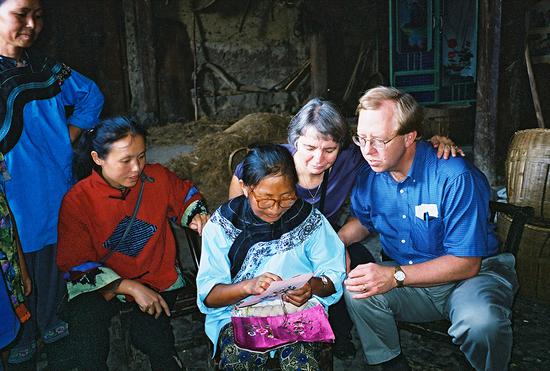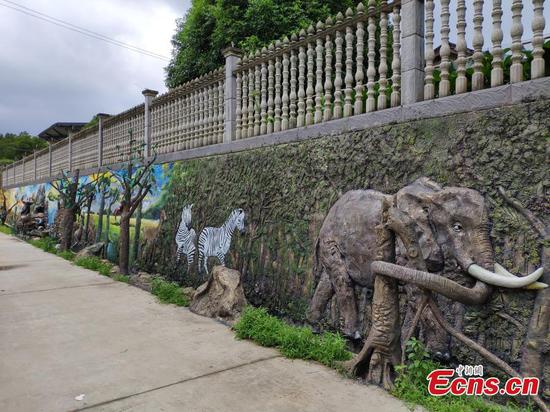
Musayif Muniyaz, a farmer in Yecheng who has been lifted out of poverty, trims poplar trees. LI LEI/CHINA DAILY
Wider success
Makit is not the only success story, though. In Yecheng county, further south in Kashgar, authorities have achieved similar goals with a slightly different approach.
Over the past four years, Yecheng has encircled large swaths of desert with belts of poplars, while large numbers of Russian olive, a more-drought-resilient tree, have been sown to improve the soil in the encircled areas.
The county government has leased the land at a low rate to an agricultural company, which uses it to grow cash crops such as goji berries, apples, watermelons and forage grass. In turn, the company's operations provide jobs for impoverished local people.
Lin Guoyin, deputy director of Yecheng's agricultural bureau, said there has been a fundamental shift in officials' attitudes toward financial input into the environment, with many realizing its significance for economic growth and poverty relief.
"A better environment is usually followed by rich agricultural output, then by the development of the manufacturing sector, and in time by tourism, which could boost local residents' incomes," he said.
He added that local tourism authorities are considering using the improved environment and the spectacular views of the sprawling Taklimakan outside the county to grow the sector.
The efforts signal the latest triumph against the deserts that wreaked havoc in past decades.
One of the earliest and most successful endeavors was at Saihanba, a forest in Hebei province that was a lush, royal hunting ground for many centuries. However, by the 1920s, its 20,000 hectares had become a sprawling desert as a result of decades of excessive logging, and it fueled sandstorms across North China.
In the 1960s, a reforestation program was introduced to restore the environment and turn the desert into a national forest park. In 2017, the achievement was recognized by the UN Environment Program, when it presented the "afforestation community" with its Champions of the Earth award.
Further success has been seen in the Kubuqi Desert in the Inner Mongolia autonomous region.
Over the past three decades, the Kubuqi Desert Greening Project has succeeded in reining in the expansion of China's seventh-largest desert, which is roughly the size of Kuwait. It has also turned about 6,000 square kilometers of the desert, about 30 percent, green.
The central authorities' push for greener development was reinforced in 2012, when the Communist Party of China added environmental preservation to its blueprint for overall construction of a socialist China, extending the previous four sectors: the economy; politics; culture; and civil society.
The move was in stark contrast to the previous development model that had been used for decades - achieving double-digit economic growth at any cost and ignoring the heavy environmental damage.
Now, officials who neglect environmental preservation face punishment. The most recent example is the Qinling Mountains of Shaanxi province, where thousands of lavish, but illegally built, villas have been demolished in the past year to restore a number of natural conservation zones at the foot of the mountain range.
Several powerful figures, including Zhao Zhengyong, former Party secretary of Shaanxi, and Wei Minzhou, a former senior provincial legislator, were dismissed after being found guilty of allowing the villas to be built. Moreover, about 1,000 local officials were censured for negligence.
Now, banners reading "lucid waters and lush mountains are invaluable assets" can been seen everywhere, both on the streets of big cities and painted on walls in villages yet to shake off poverty.
That maxim, coined by President Xi Jinping in 2005 when he was Party secretary of Zhejiang province, is guiding officials at all levels, from high office to the grassroots.
Jia Junping, head of Chengchuan township, Gansu province, where reforestation efforts have been ongoing for 30 years, said the continuous investment in the environment in the area, a major apple production base, has been repaid several times over.
He added that the improved forestry coverage has resulted in higher levels of rainfall, which has slashed the sky-high cost of irrigating the orchards.
"Drought used to be commonplace, but the tree-planting program has changed that for good," he said.















